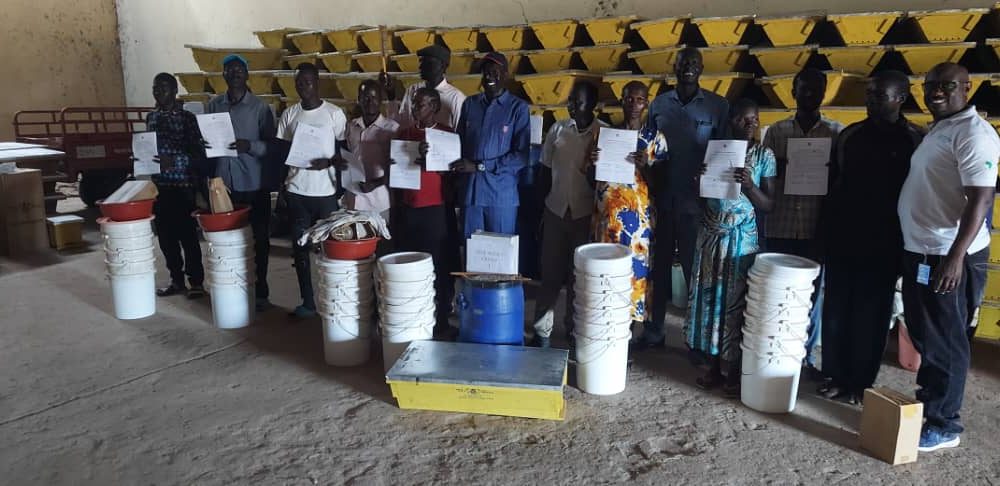By Yang Ater Yang
Lakes State government and United Nations Food and Agricultural Organization (UNFAO) have handed over 500 modern honey production, processing, and logistic equipment to beekeepers in Wulu County.
The equipment, donated by UNFAO will support 10 groups of beekeepers in increasing honey production and processing.
Minister of Agriculture, Environment, and Forestry, Poth Majak Daljang, praised UNFAO for its support and urged the groups to maintain the equipment to continue producing more honey.
He also urged UNFAO to organize exchange visits to train beekeepers in various counties of Lakes State.
Wulu County Commissioner Jima Daffala Rejab called for partners to help the honey and Shea butter factories in Wulu County.
He emphasized that UNFAO’s distribution of items like boxes, gumboots, overalls, and buckets to beekeepers and Shea butter groups should not be owned as personal property.
Rejab also highlighted the weak honey production in Wulu County due to insufficient rain, which could negatively impact the factory.
UNFAO Head Field Office Hannigton Sebaduka said they are working on a sector-level market linkage strategy in the honey and Shea butter sector, with support from Norway.
In Wulu County, he said 300 beekeepers, both male and female have been trained and equipped with modern production techniques.
“The focus is on enhancing the capacity of beekeepers in Lakes State, starting with Wulu County,” he said.
He said modern kit beehives are three times more productive than traditional beehives and offer opportunities for value addition.
“FAO ensures that beekeepers receive maximum incomes from their production and equipment, including wax and pollen.”
To make the honey sector gender-friendly, the organization has decided to provide honey harvesting gear that is women’s friendly and gender-friendly, he added.
“This will allow women to participate in harvesting activities and ensure that the beehive is placed at a lower level where they don’t need to climb. The sector will be more inclusive and competitive with additional value-added products.”
John Morik Michang, a Trainer of Trainees (TOT) of the honey and bee keeping group expressed gratitude to the UNFAO for introducing modern technology.
He emphasized that the Kenya Top Bar is safer than traditional methods, as it allows for the harvesting of honey without killing bees and ensures the honey does not smell smoke.
Michang also encouraged the community to continue keeping bees and selling queens and queens to generate income.
The Kenya Top Bar beehive also allowed for the production of wax, which can be used to make wax and bee pollen, which can also generate income.
Mary Sura, a woman representative, expressed her gratitude to the UNFAO for the program brought to Wulu County and stated her satisfaction with the work done in the honey factory.
She noted that the new technology allowed for the production of honey without boiling and was clean and easy to transport.
Sura said that the honey factory was brought to them by Oxfam and has brought significant changes to Wulu County.
She stated that honey production has brought a lot of benefits to the community, including food for their children and clothing for those in need.



